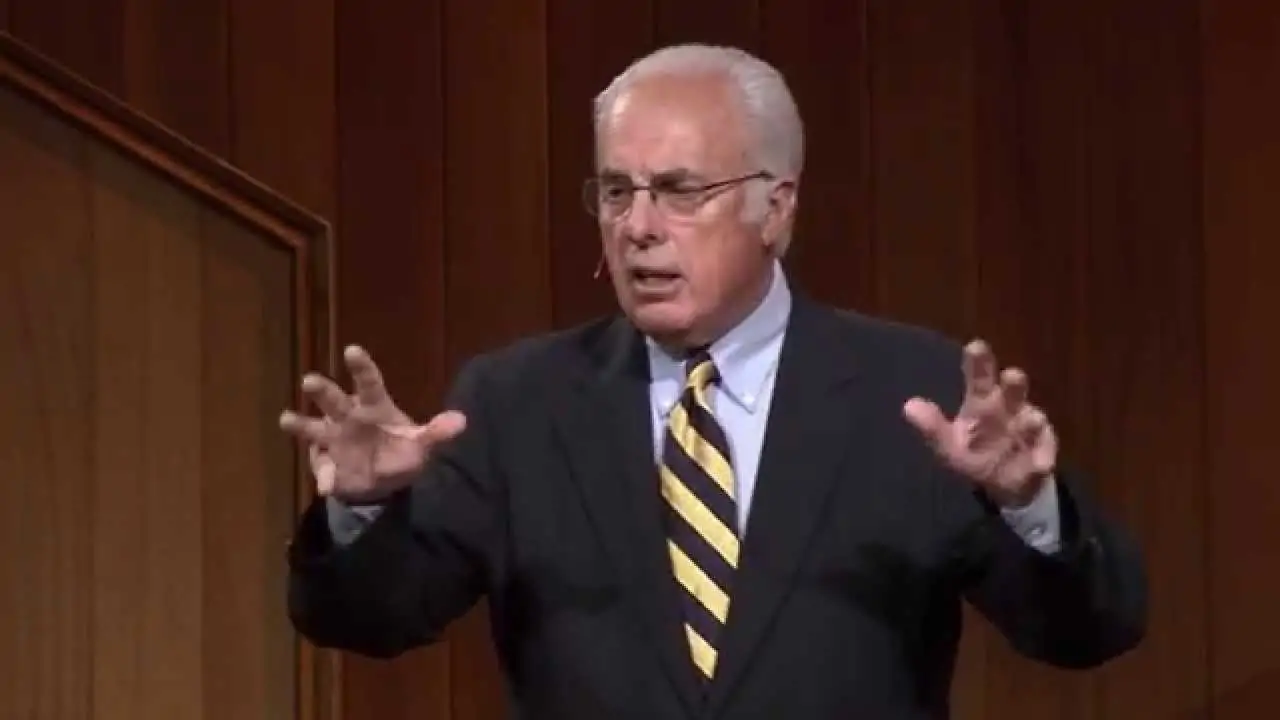
John Fullerton MacArthur, Jr. is one of the biggest names in evangelical Christianity. He’s the founder of Grace to You ministries, the president of The Master’s University and the teaching pastor of Grace Community Church. His Calvinist and Cessationist apologetics have been driving theological forces throughout the evangelical world, and his millions of study Bibles and other books sold inform the consciousness of Christians across the world. So when MacArthur steps into the fray of one of the most polarizing issues of our day, he’s bound to make waves.
Recently, MacArthur began his latest blog series “Social Injustice to the Gospel.” It’s a powerful polemic and a refutation of the kind of evangelical leaders The Gospel Coalition has been promoting. It’s rooted in MacArthur’s own experience in the Civil Rights movement and the broader Church, but it’s also unfortunately and deeply misguided.
From MacArthur’s piece:
[lborder]
The evangelicals who are saying the most and talking the loudest these days about what’s referred to as “social justice” seem to have a very different perspective. Their rhetoric certainly points a different direction, demanding repentance and reparations from one ethnic group for the sins of its ancestors against another. It’s the language of law, not gospel—and worse, it mirrors the jargon of worldly politics, not the message of Christ. It is a startling irony that believers from different ethnic groups, now one in Christ, have chosen to divide over ethnicity …
Over the years, I’ve fought a number of polemical battles against ideas that threaten the gospel. This recent (and surprisingly sudden) detour in quest of “social justice” is, I believe, the most subtle and dangerous threat so far.
[/lborder]There are three critical mistakes John MacArthur makes in his introductory piece, any of which pose a threat to the witness of the evangelical Church and the progress that’s been made on racial reconciliation over the past few years.
1. Gospel Justice Does Not Preclude Social Justice
MacArthur starts his argument well: He acknowledges full-stop that racial injustice is real and rooted in a history that goes back to the Bible, but things become shaky as he establishes his bona fides. MacArthur tells us about the discrimination he experienced preaching alongside black evangelical and activist Dr. John Perkins. MacArthur tells us how he has tasted the rotten fruit of racism and about his pilgrimage to the site of King’s assassination just hours after the event. He uses this experience to validate his conviction that “the only long-term solution to every brand of ethnic animus is the gospel of Jesus Christ … The black leaders with whom I ministered during the civil rights movement shared that conviction.”
In a sense, MacArthur is right. This world is broken, and the stain of sin and racism will likely be with us until Glory. But the civil rights leaders with whom MacArthur ministered don’t actually agree with all the implications behind MacArthur’s claim. Consider the words of Perkins himself:
[lborder]
Justice is any act of reconciliation that restores any part of God’s creation back to its original intent, purpose or image. When I think about justice that way, it doesn’t surprise me at all that God loves it. It includes both the acts of social justice and the restorative justice found on the cross.
[/lborder]
In other words, the Gospel is crucial to justice. But so is immediately addressing the ongoing pain experienced by people of color throughout the country. Jesus Christ ultimately satisfying justice does not indemnify us from securing what justice we can serve in the meantime.
MacArthur himself has argued Christians ought to vote against politicians who support abortion, though presumably the Gospel is the only ultimate solution to that issue as well. Just as MacArthur advocates for political solutions to secure social justice for the unborn, he should listen to those he evokes and support efforts to secure social justice for the racially marginalized.
2. Racial Reconciliation Does Not Preclude Gospel Preaching
MacArthur moves from self-credentialing to accusation. He calls out the “evangelicals who are saying the most and talking the loudest these days,” claiming they are using the language of “law not Gospel,” and co-opting the “jargon of worldly politics.”
Here, he is clearly talking about the leading evangelical voices on racial reconciliation, like Thabiti Anyabwile, Dr. Russell Moore, Lecrae and Matt Chandler. Anyabwile in particular has emerged as the leading voice among reformed evangelicals on race, and these accusations land most directly at his feet. The accusations have a difficult time sticking.
For instance, MacArthur accuses these leaders of choosing “to divide over ethnicity,” and disdaining their unity in Christ “in favor of fleshly factions.” Such an accusation makes little sense when one realizes how frequently Anyabwile meets with white Christians in the city he pastors (Washington, D.C.), and the close bonds of fellowship formed between pastors of white, black and hispanic majority churches in that city.
As we zoom out over the national conversation, the accusation is even less coherent: At the most recent SBC convention, a majority white room joined with black evangelicals to condemn racist theology and support the “full dignity of every human being,” including those of every ethnicity. Evangelical leaders on racial reconciliation are not dividing over race. Instead, they are reaching across divides that have existed in the Church even before the days denominations were split over slavery.
None of these pastors or leaders have shirked or shied away from the Gospel. Matt Chandler, author of The Explicit Gospel and pastor of the Village Church recently wrote about the radical reactions of those who condemned his occasional mentions of racial reconciliation from the pulpit, in a somewhat prophetic prediction of MacArthur’s accusations. Chandler’s most recent sermon, entitled “A Gospel Reminder,” contains the word “Gospel” almost 30 times and expounds for almost 40 minutes the continual need for Christians to focus on the core message of the Gospel. To accuse men like Chandler of swerving from the Gospel is to make an accusation that disintegrates in the presence of their ministries.
3. Law Does Not Preclude Gospel
The most bizarre of MacArthur’s accusations asserts evangelicals are using the language of “law, not gospel.” The implication seems to be that only the language of Gospel can address the sin of racism. This focus of Gospel over law is consistent with MacArthur’s general ministry: He has no sermons listed online from Leviticus, Deuteronomy or Numbers, but has preached through the entire New Testament. Nevertheless, MacArthur seems to have understood the difference between the Law and Gospel in a sermon on 1 Timothy:
[lborder]
That’s what the law is for. The law is to crush sinners, the law is to show who we really are. The law is good but the law is not good news. The law is good but it’s not Gospel … not alone, it wasn’t made for righteous men, it was made for sinners so they could see their sin.
[/lborder]
The law is, in other words, for the disobedient. The Gospel responds to Law and provides a way out of that sin through repentance and faith in Christ Jesus. Law tells us we are guilty and need to repent. The Gospel tells us Christ has set the Christian free.
When evangelicals speak on racial reconciliation they frequently speak to three points:
1) Racism is an ongoing and present sin, inside and outside the Church;
2) Racism hurts people of color every day;
3) Racism needs to be repented of.
MacArthur is right: The language of Law needs to be present in that conversation. If a sin is ongoing and unrepented of, Law exists to remind people of the need to repent. To love our marginalized neighbors, we must acknowledge that sin and the harm it causes. But to love our racist or complicit neighbors, the Gospel needs to provide a way out of white supremacy and systemic racism. That’s exactly the case Anyabwile makes in The One Sin That Must Not Be Confessed:
[lborder]If we intentionally or unintentionally come to the conclusion that what must be confessed is “sin” abstractly rather than racism specifically, then I’m afraid our doctrines of sin and confession become a hindrance to repentance, sanctification, and reconciliation rather than a help. We can’t overcome something we won’t admit … That specificity was the path to their freedom from sin and integrity with God. We should address specific sins of groups the way John the Baptist did, including the sin of racism.”
[/lborder]MacArthur seems to reject this line of thought in his declaration that using the language of Law is somehow counter-ethical to the Gospel. But when evangelical leaders are confronting a problem that has roots inside and outside the church, it becomes difficult to understand why he expects the world to respond to Gospel, or why he would condemn the use of Law to do what the law does: convict the guilty of sin and usher them toward Jesus.
Over the next several weeks, there will be more blogs written in MacArthur’s winsome voice and familiar language, aimed at urging evangelicals to step back from the ongoing work of racial reconciliation. Christians should not be confused: This work is ongoing, it is good, and it is perfectly in line with the Gospel that lies at the heart of every genuine Christian ministry.






















